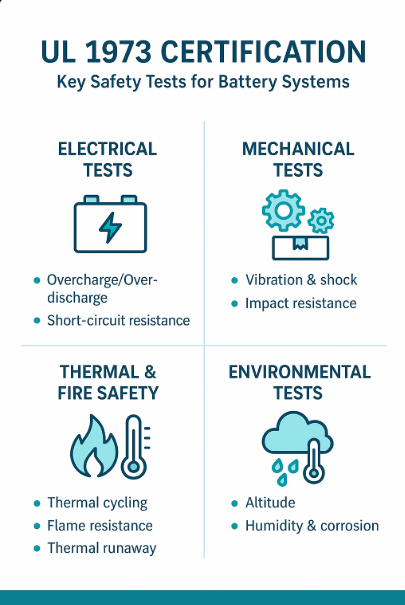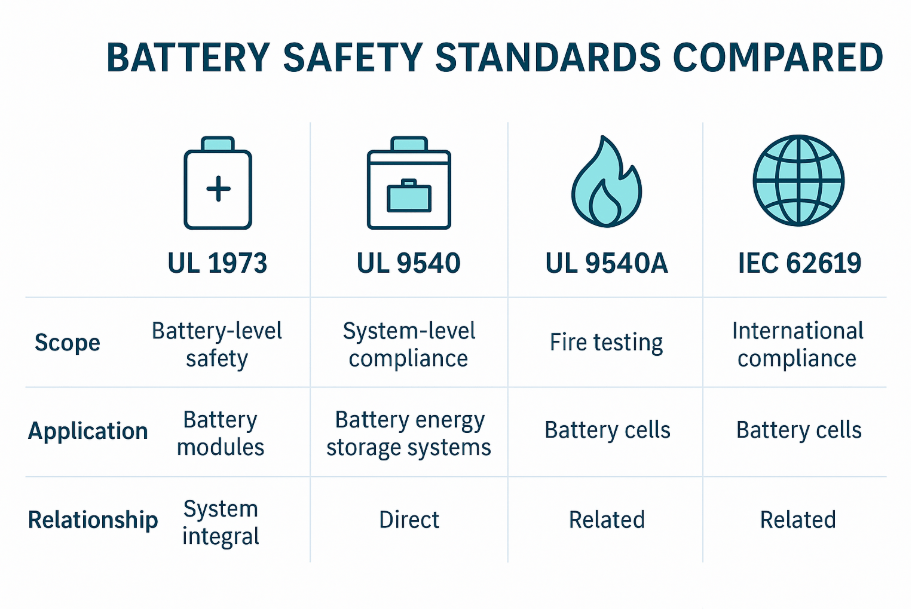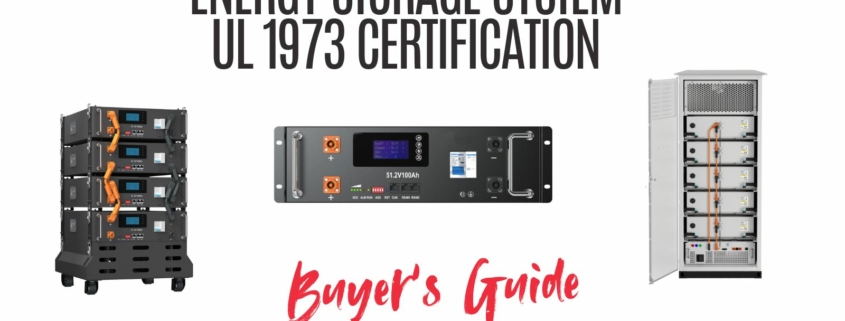UL 1973 Certification: The Safety Standard for Modern Battery Systems
As energy storage technologies power everything from homes to large-scale grids, safety and compliance have become non-negotiable. Among the most important safety benchmarks is UL 1973 certification, the globally recognized standard for stationary batteries and energy storage systems.
This certification validates that a battery has passed rigorous safety and performance tests, ensuring it can operate reliably under real-world conditions. For manufacturers, system integrators, and project developers, achieving UL 1973 certification is not only about compliance—it is about protecting customers, enabling market access, and building trust.
What Is UL 1973 Certification?
UL 1973, formally titled “Batteries for Use in Stationary, Vehicle Auxiliary Power, and Light Electric Rail Applications,” defines the testing requirements for rechargeable batteries used in non-automotive settings.
In simpler terms, if you are producing a Battery Energy Storage System (BESS) or a stationary backup solution, UL 1973 is the certification you need to prove safety.
The standard covers:
- Electrical safety (short-circuit, overcharge, abnormal charging)
- Mechanical safety (vibration, shock, impact resistance)
- Thermal safety (temperature cycling, fire resistance, thermal runaway prevention)
- Environmental durability (humidity, corrosion, altitude testing)
👉 Related Reading: Difference Between BESS and ESS
Why UL 1973 Matters for Battery Manufacturers and Integrators
Battery failures are not just technical risks—they carry financial, legal, and reputational consequences. By obtaining UL 1973 certification:
- Market Access: Many regions, including North America, require UL compliance before commercialization.
- Customer Confidence: Certified systems are trusted more by utilities, C&I customers, and regulators.
- Reduced Liability: Certification demonstrates due diligence in meeting safety requirements.
- Integration with Other Standards: UL 1973 certification is often a prerequisite or complement to UL 9540 for full energy storage system compliance.
👉 Learn More: UL 9540 vs. UL 9540A: What’s the Difference?
Key Tests in UL 1973 Certification
To achieve certification, batteries undergo a wide range of evaluations. Some of the most critical include:

1. Electrical Abuse Tests
- Overcharge / Over-discharge – Verifies how cells handle extreme electrical conditions.
- Short-circuit resistance – Ensures protective circuits prevent hazards.
2. Mechanical Tests
- Vibration and shock testing – Simulates transportation and installation stresses.
- Impact resistance – Evaluates casing and module integrity.
3. Thermal & Fire Safety
- Thermal cycling – Repeated heating and cooling to test durability.
- Flame resistance – Verifies the system’s ability to resist ignition.
- Thermal runaway testing – Ensures proper containment under failure.
4. Environmental Tests
- Altitude testing – For high-elevation installations.
- Humidity and corrosion tests – Verifies performance in harsh climates.
👉 Related Reading: IEC Certifications for BESS
UL 1973 vs. Other Battery Standards
Many companies confuse UL 1973 with other standards. Here’s how it fits into the bigger picture:

| Standard | Scope | Application | Relationship |
|---|---|---|---|
| UL 1973 | Stationary & rail batteries | Cell & module level | Foundation safety testing |
| UL 9540 | Energy storage systems | System-level BESS | Requires UL 1973-certified components |
| UL 9540A | Fire safety testing | Propagation & thermal runaway | Complements UL 1973 |
| IEC 62619 | International battery safety | Global markets | Often paired with UL for dual compliance |
👉 See Our Guide: UL 9540 Certification Explained
Challenges in Obtaining UL 1973
While certification is essential, the path can be complex. Common challenges include:
- Long testing timelines (6–12 months depending on lab capacity)
- High costs for prototype testing and certification cycles
- Design changes triggered by failures in early testing
- Documentation requirements (schematics, safety analysis, BMS reports)
Sunlith Energy helps clients streamline compliance by aligning battery designs with UL requirements early in the product development cycle.
How Sunlith Energy Supports UL 1973 Certification
At Sunlith Energy, we don’t just deliver battery solutions—we ensure they are market-ready and compliant. Our support includes:
- Design consulting – Ensuring your battery pack meets UL 1973 requirements from the ground up.
- Pre-certification testing – Identifying weak points before official lab submission.
- Documentation support – Preparing technical files, test reports, and safety manuals.
- Partnership with certified labs – Speeding up the testing and approval process.
👉 Contact Us: Sunlith Energy
FAQs: UL 1973 Certification
Q1. What is UL 1973 certification?
It is a safety certification for stationary and rail-use rechargeable batteries that validates performance under electrical, mechanical, and thermal stress.
Q2. Is UL 1973 mandatory for all batteries?
No, it applies primarily to stationary and auxiliary power systems, not automotive traction batteries (those follow UL 2580).
Q3. How long does certification take?
Typically 6–12 months, depending on battery complexity and lab availability.
Q4. How does UL 1973 relate to UL 9540?
UL 1973 ensures the safety of the battery itself, while UL 9540 covers the entire storage system. Most UL 9540 certifications require UL 1973-approved components.
Q
Final Thoughts
In the competitive energy storage landscape, UL 1973 certification is more than just a box to check—it is your gateway to trust, compliance, and market success. Whether you’re developing a new stationary storage solution or scaling up production, aligning with this standard protects your customers, your business, and your brand.
At Sunlith Energy, we combine technical expertise with compliance experience to help you achieve certification faster and more cost-effectively.
👉 Ready to take your battery system to the next level? Talk to Sunlith Energy today.


